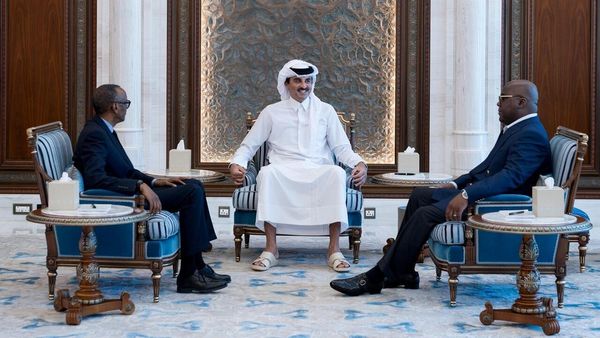
Harry Maguire was just finishing a training session this year when he received an anonymous email, sent via his agent. The email explained that three bombs had been planted at his house in Wilmslow and that he was being given 72 hours to leave Manchester United before they would be detonated.
Naturally the police were called immediately, a sniffer dog was dispatched to conduct a thorough search of Maguire’s house and garden, and no explosives were found. Maguire rushed home from Carrington to be with his family, and while his fiancée and children were moved to a safehouse, Maguire moved in with a teammate for a few days. Nobody was arrested.
There is, of course, plenty to be said here about the increasingly sinister tone of online discourse, football’s relationship with fame, perhaps even the role of the media in anointing heroes and villains. But I’m more interested in examining how an experience such as that might shape Maguire himself. How do you deal with the brief and distressing possibility that your football career – the very thing upon which you have built your life and livelihood, your identity and your joy – could ultimately culminate in your whole family being murdered? What does that do to you? How does it affect your relationship to football?
This is a World Cup like no other. For the last 12 years the Guardian has been reporting on the issues surrounding Qatar 2022, from corruption and human rights abuses to the treatment of migrant workers and discriminatory laws. The best of our journalism is gathered on our dedicated Qatar: Beyond the Football home page for those who want to go deeper into the issues beyond the pitch.
Guardian reporting goes far beyond what happens on the pitch. Support our investigative journalism today.
In many ways, the bomb threat was perhaps the logical culmination of what we might describe as English football’s Maguire-industrial complex: an industry that grew up around his towering performances in the 2018 World Cup before juddering violently in the other direction. Just as Maguire became the face and the forehead of a new, humbler and more relatable England side, so he would become the face and flailing limbs of their regression, the emblem of a United team struggling to define their identity under four successive managers.
Why Maguire? There were other flatlining players around him, and yet nobody – as far as we know – ever sent a bomb threat to Paul Pogba or threatened to kill the family of John Stones. Perhaps, on some level, the same qualities that fleetingly made Maguire a cult hero also made him a target: his visibility and thinly veiled eagerness, his willingness to put himself out there, to keep trying things, to keep volunteering for post-match interview duties. If you’re angry enough to swing a punch, you’re probably just going to punch the first face you see.
The point here is not to launch an impassioned defence of Maguire’s football ability, a topic upon which you will almost certainly have made up your mind already. But there is an unsolved mystery here. At United Maguire is now the fourth-choice centre-half under Erik ten Hag, having made just one league start in three months. With England he remains as vital as ever: player of the tournament at Euro 2020 and a certainty to start his third successive game, against Wales on Tuesday night. What might explain the disparity? A glance at Maguire’s data for club and country offers a little illumination. At Leicester City in 2017-18, perhaps his last season of relative anonymity, he completed 51 successful dribbles and made 115 progressive passes (defined as moving the ball forward at least 10 yards).

This was the classic early Maguire: enterprising on the ball, a springboard for attack, a defender of pure vibes. Gradually, those numbers have gone into decline. So far this season at United he has made four progressive passes. Most tellingly of all, he is yet to complete a dribble.
You might be tempted to conclude, then, that Maguire has become a more limited, less ambitious player over time. And yet in England colours, the very opposite process seems to have occurred. If you take his three tournaments (with the caveat that he has played only two games here), his dribbling and progressive passes have increased from 2018 to 2022.
Against the USA he provided perhaps the game’s finest piece of skill, an outrageous slalom near the left byline that very nearly produced a shot on goal.
So what’s happening here? Well, let’s say you’ve received an anonymous email threatening to blow up your family. In the short term, you beef up your home security systems, hold your loved ones tight, turn your world inwards. Perhaps you even become a little colder, a little less available, a little more suspicious. But ultimately, this is not who you are. This is not the guy who travelled to Euro 2016 as a paying spectator and was playing for them a year later.
And so it is not possible that over time you begin to mourn that simpler version of life? A time before you were an £85m defender being dissected and menaced every weekend. A time when you could make a mistake and receive a valuable lesson instead of a death threat. A time when you still had room to grow and improve, to find the size and shape of your game.
United can never offer that to him, which is probably why he should leave as soon as is feasible. But on some level, England still can. On England duty he is no longer a world-record signing, no longer the public face of a listing hulk. He has a manager who trusts and values him, a system he knows and recognises, more time on the ball and more licence to use it. The fans, for all their occasional foibles, are usually more generous. There are familiar faces, happy memories, good vibes.
Perhaps, temperamentally, tournament life seems to suit Maguire. Watch him on the pitch and what you see above all is a search for hard feelings: the crunch of a well-timed defensive header, the thrill of a surging dribble, the goal that will change everything. None of this is really a predictor of success or failure. But it may just explain why he seems happier here than anywhere else.







